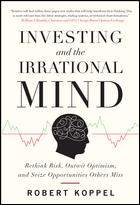 This was an interesting book for me. I found that the research that author Robert Koppel has compiled from various sources throughout academia lends a great deal of insight into the “why?” of activities by individuals, professional traders, and others that take part in the great game of investing.
This was an interesting book for me. I found that the research that author Robert Koppel has compiled from various sources throughout academia lends a great deal of insight into the “why?” of activities by individuals, professional traders, and others that take part in the great game of investing.
Even though the majority of the discussion and analysis that Koppel brings forth deals with professional traders, the behavioral psychology applies to individual, non-professional investors as well.
An example of a particularly interesting passage is one where Koppel quotes Nassim Taleb from his book, The Black Swan – effective responses to Black Swan Events (such as the 2008 economic crisis or the 9/11 crisis):
- What is fragile should break early, while it is still small. Nothing should ever become too big to fail.
- There should be no socialization of losses and privatization of gains.
- People who were driving a school bus blindfolded (and crashed it) should never be given a new bus.
- Do not let someone making and “incentive” bonus manage a nuclear plant – or your financial risks.
- Counterbalance complexity with simplicity.
- Do not give children sticks of dynamite, even if they come with a warning.
- Only Ponzi schemes should depend on confidence. Governments should never need to “restore confidence”.
- Do not give an addict more drugs if he has withdrawal pains.
- Citizens should not depend on financial assets or fallible “expert” advice for their retirement.
- Make an omelet with the broken eggs.
The above list should give you some insight into this book. It’s not your typical, conventional viewpoints on the activity of investing – buying and selling stocks, bonds, mutual funds and the like. Koppel takes what he knows from his own personal experience (former member of the Chicago Mercantile Exchange, hedge fund partner, and president of his own division at Rand Financial) as well as discussions with dozens of other folks in the industry, and applies recent psychological findings to it.
Through this application of psychological findings it becomes clear that there is a specific set of skills that leads to success in investing. Koppel infers that this set of skills is learnable – once you discover and assuage the negative patterns of thought and action that lead to failure. Much the same as a master sommelier’s ability to discern a wine’s source grape from a mere whiff and a slurp, the professional investors who have learned these skills are often capable of “pulling the trigger” on a purchase or sale of a financial asset in the face of compelling psychological factors that would urge a man to choose otherwise.
Some of these factors include: having a goal for your investing activity; having a plan for both getting into and getting out of every position; understanding your own irrational thought processes and developing a framework for overcoming them; and using your most powerful investing tool – your intuition.
Koppel explains these factors and skills in terms not only of investing, but of sports, love, gambling, and many other facets of life – since the folks who have developed the skill set apply the skills to many areas. It just so happens that some of these successful folks are also investors for a living.
Although I doubt if reading this particular book will remedy all psychological ills that the investor faces, it does help, in my opinion, to begin to put a face on the things that we do to ourselves that work against our success in investing.
The above book review is part of a series of reviews that I am doing in an arrangement with McGraw-Hill Professional Publishing, where MH sends me books with the only requirement being that I read the book and write a review – like it or not. If you find the information in this review useful, let me (and McGraw-Hill) know!


 Sterling Raskie, MSFS, CFP®, ChFC®
Sterling Raskie, MSFS, CFP®, ChFC® The latest in our Owner’s Manual series, A 401(k) Owner’s Manual, was published in January 2020 and is available on
The latest in our Owner’s Manual series, A 401(k) Owner’s Manual, was published in January 2020 and is available on  A Medicare Owner’s Manual, is updated with 2020 facts and figures. This manual is available on
A Medicare Owner’s Manual, is updated with 2020 facts and figures. This manual is available on  Social Security for the Suddenly Single can be found on Amazon at
Social Security for the Suddenly Single can be found on Amazon at  Sterling’s first book, Lose Weight Save Money, can be
Sterling’s first book, Lose Weight Save Money, can be  An IRA Owner’s Manual, 2nd Edition is available for purchase on Amazon. Click the link to choose the
An IRA Owner’s Manual, 2nd Edition is available for purchase on Amazon. Click the link to choose the  Jim’s book – A Social Security Owner’s Manual, is now available on Amazon. Click this link for the
Jim’s book – A Social Security Owner’s Manual, is now available on Amazon. Click this link for the  And if you’ve come here to learn about queuing waterfowl, I apologize for the confusion. You may want to discuss your question with Lester, my loyal watchduck and self-proclaimed “advisor’s advisor”.
And if you’ve come here to learn about queuing waterfowl, I apologize for the confusion. You may want to discuss your question with Lester, my loyal watchduck and self-proclaimed “advisor’s advisor”.